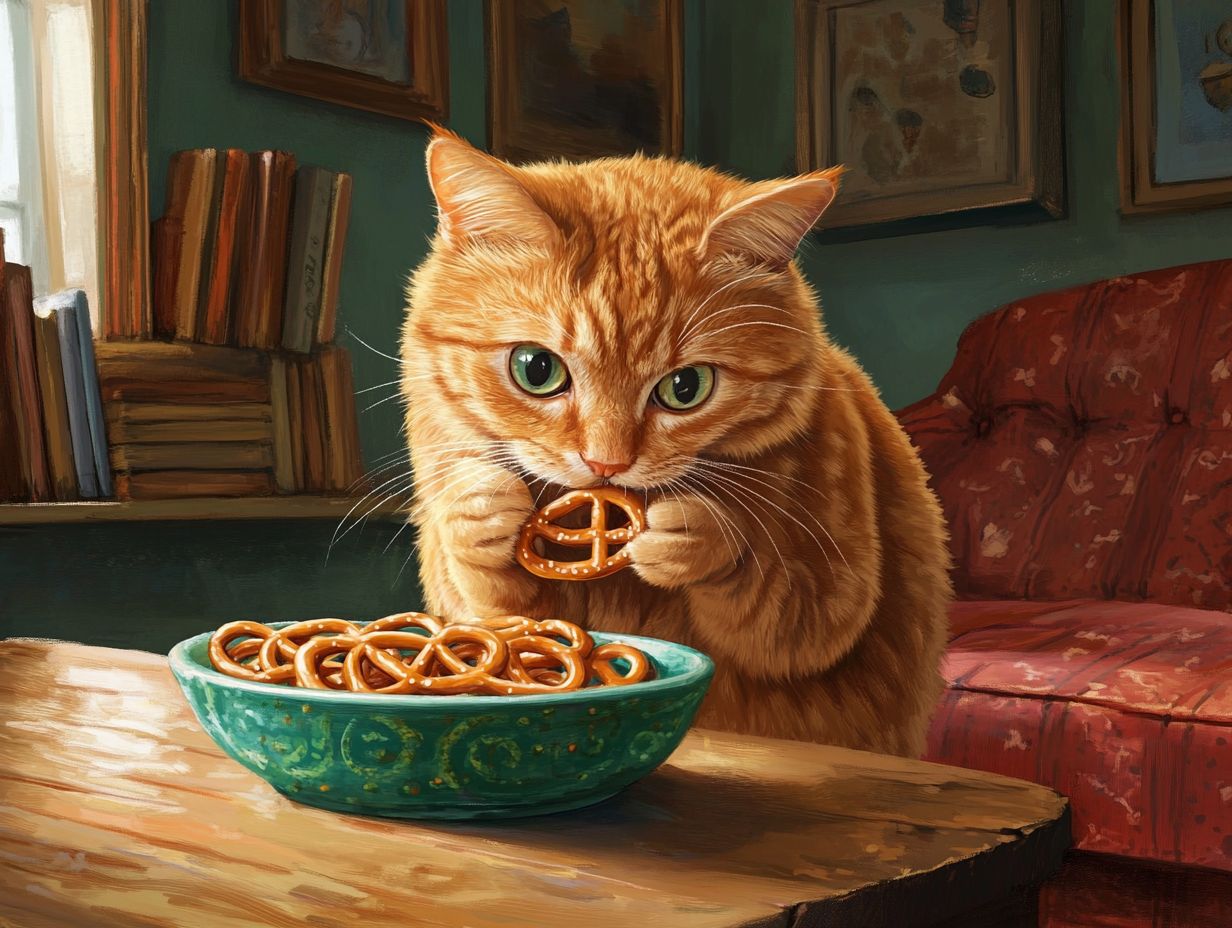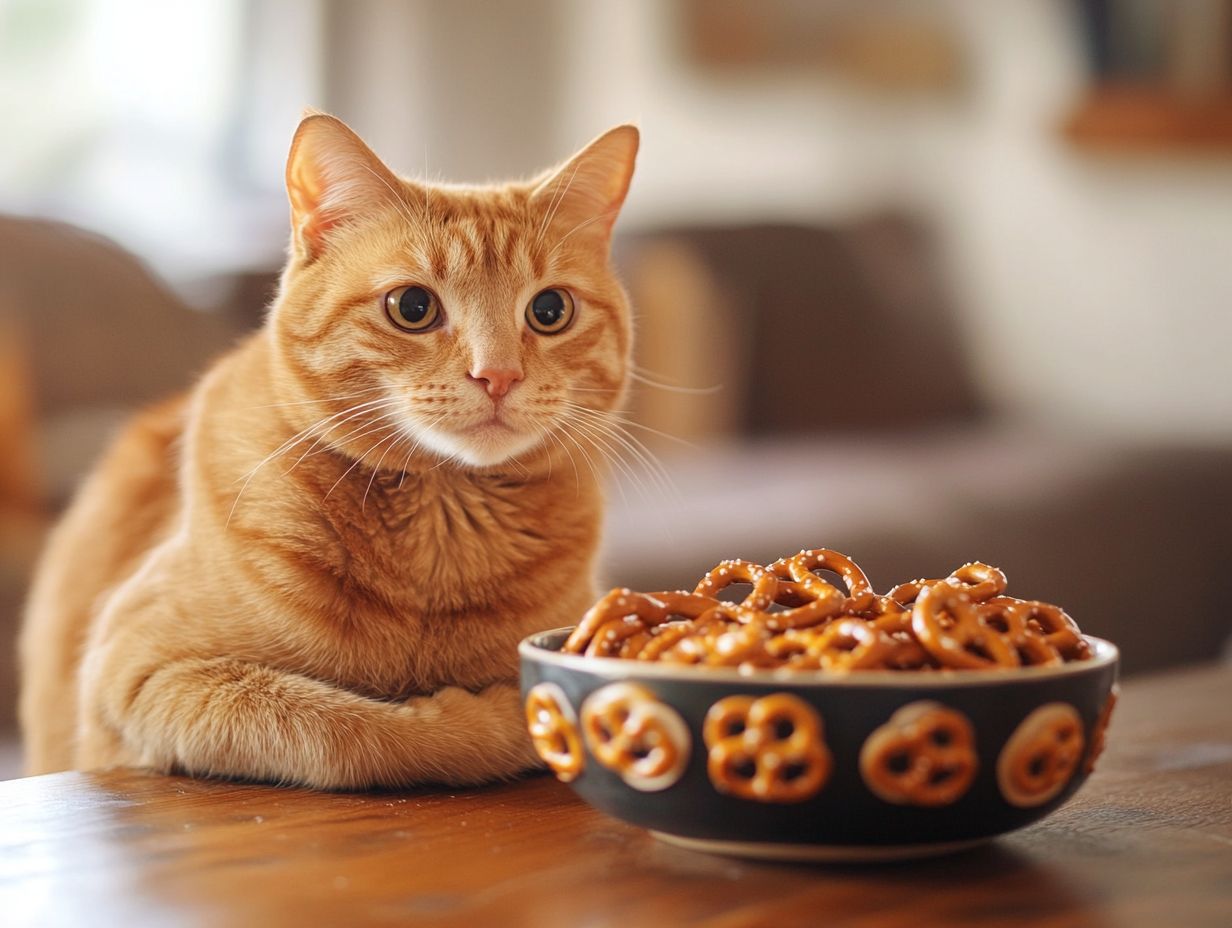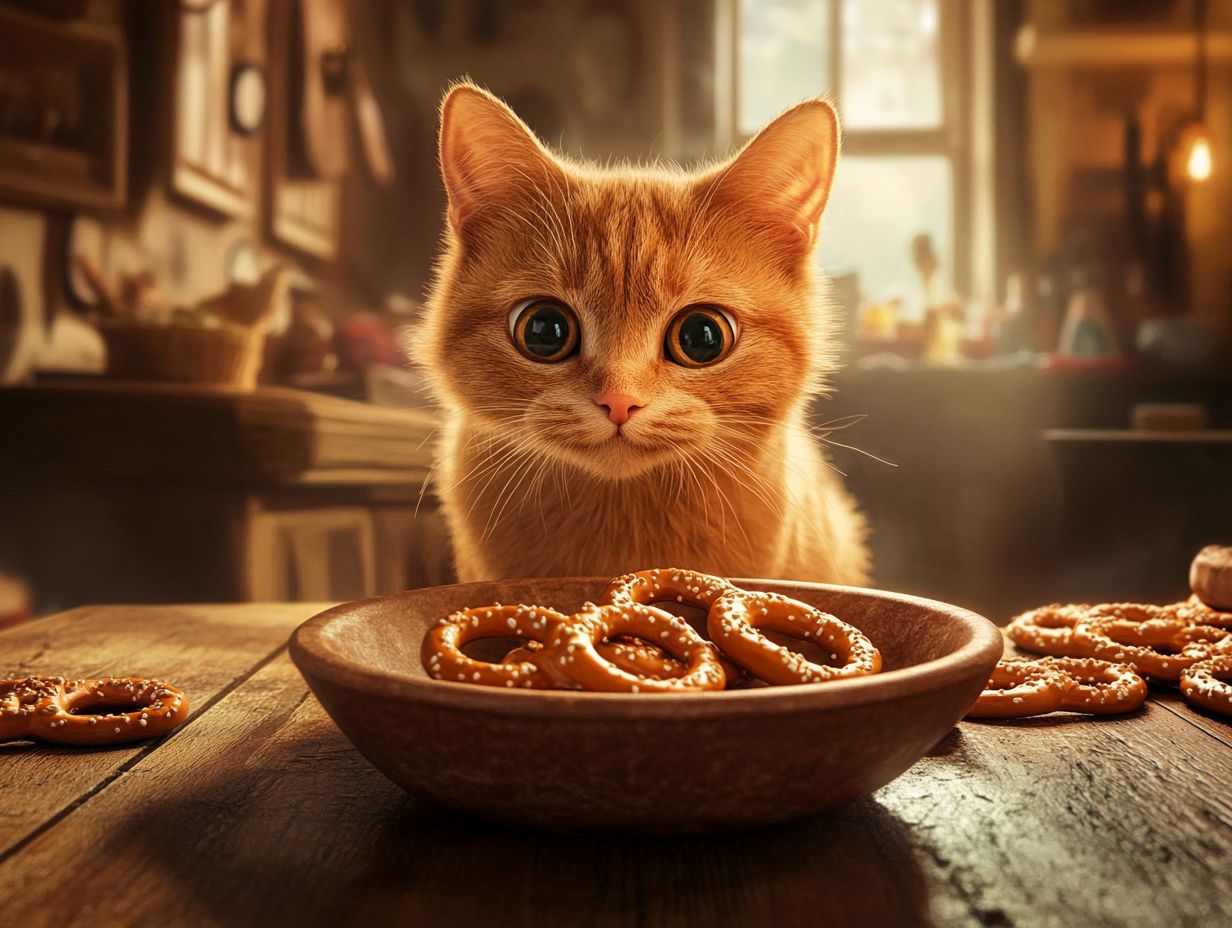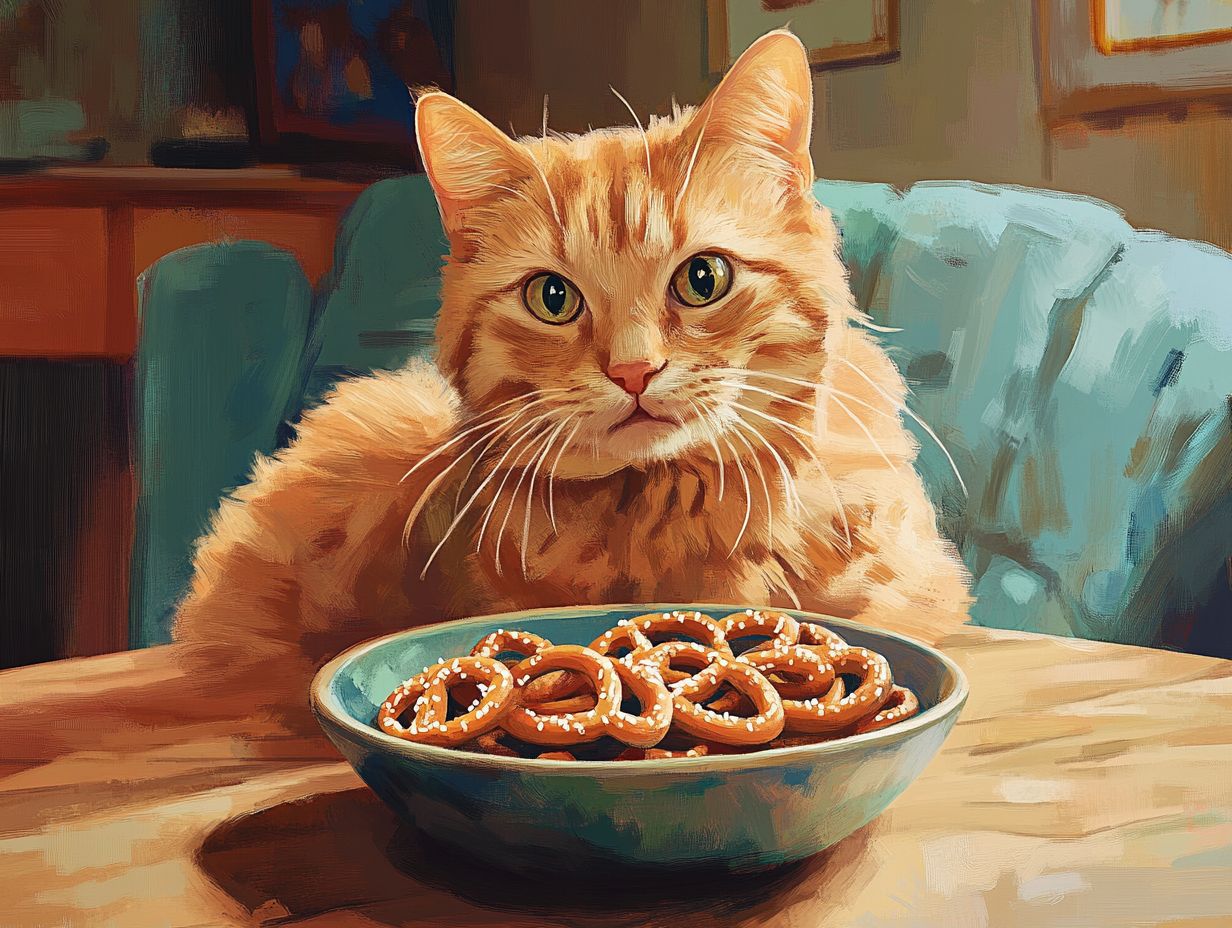Curious about whether your feline friend can indulge in pretzels? While it might be tempting to share a salty snack with your cat, pretzels are not safe for cats and should be approached with caution.
This article explores why pretzels aren’t suitable for their diet, highlights the potential risks involved, and discusses why pretzels are considered harmful foods for cats.
We will guide you on what steps to take if your cat accidentally munches on some salty snacks or other foods they should avoid. Read on to ensure your kitty stays happy and healthy, avoiding common harmful foods like chocolate and onions!
Key Takeaways:

- Cats should not eat pretzels as they can be harmful to their health, potentially causing choking hazards and other health issues.
- Pretzels contain ingredients that are not safe for cats, such as high levels of salt and potential allergens like wheat.
- If your cat accidentally consumes pretzels, monitor them closely and seek immediate veterinary help if they show any signs of illness.
Can Cats Eat Pretzels?
Cats are naturally curious animals, and as pet owners, we often wonder whether they can eat the same foods we enjoy, including pretzels. However, despite their seemingly harmless appearance, pretzels are dangerous for cats and should be avoided, similar to other toxic foods like garlic and grapes.
Many human foods can be toxic to felines, and pretzels are typically high in salt and other additives, which can be unhealthy if consumed regularly, even if they are not outright toxic. Therefore, it’s essential to understand whether pretzels are harmful to cats and to explore what other foods might be safe for them to eat.
The Answer and Potential Risks
While pretzels are not considered toxic to cats, they can pose certain risks that cat owners should be aware of. The most significant concern is the high sodium content in pretzels. Cats are sensitive to salt, and excessive salt intake can lead to issues such as increased thirst, frequent urination, and even salt poisoning.
Additionally, some preservatives and additives found in commercial pretzels can disrupt a cat’s digestive system, resulting in gastrointestinal problems. Overall, pretzels fall into the category of human foods that are unsuitable for a cat’s diet, much like raw dough and caffeine. For more information on the risks and dangers, check out Can Cats Eat Pretzels? Risks and Dangers.
Plain cooked chicken or specially formulated cat treats are safer and healthier options for rewarding your pets.
Why Pretzels are Not a Healthy Choice for Cats
The nutritional content of pretzels and their associated health effects indicate that they should not be fed to cats. While they may appear to be a harmless and enjoyable snack, pretzels are actually one of the unhealthy options for cats due to their high sodium and preservative levels, which can lead to dehydration and other health issues.
Furthermore, pretzels lack the essential nutrients that cats need, making them a poor choice compared to healthier snacks like those containing safe proteins or herbs. Therefore, the nutritional profile of pretzels is a crucial factor to consider when discussing why they are unsuitable for feline diets.
Ingredients to Avoid and Why

Pretzels contain ingredients that can be harmful or unhealthy for cats, making it essential for pet owners to be aware of them. The most significant concern is salt.
Cats are unable to effectively excrete sodium, which can lead to salt poisoning. Excessive sodium in the body can result in symptoms such as vomiting, diarrhea, and even seizures. Additionally, preservatives like potassium sorbate and artificial flavorings present in pretzels offer low nutritional value and may cause gastrointestinal distress.
Common Symptoms of Salt Poisoning
If your cat consumes pretzels, be vigilant for symptoms of salt poisoning, which may include:
- Excessive thirst
- Frequent urination
- Vomiting
- Lethargy
- Seizures in severe cases
Action Steps if Your Cat Eats Pretzels
- Watch for symptoms like excessive thirst, vomiting, diarrhea, or lethargy.
- Contact your veterinarian immediately if your cat exhibits any of these symptoms.
- Provide fresh water to help your cat stay hydrated.
Benefits of Alternative Treats
Consider offering your cat plain cooked chicken or specialized cat treats in moderation. These options provide essential nutrients such as proteins and omega fatty acids that contribute to feline health improvements, making them safer than pretzels. As a general guideline, treats should make up no more than 10% of your cat’s daily caloric intake.
Conclusion
In summary, pretzels are unsuitable for cats due to their high sodium and preservative content, which can lead to health issues. Opt for healthier snack options like plain cooked chicken or specially formulated cat treats to ensure your cat’s well-being.
Are pretzels safe for your cat? Understanding the risks associated with pretzels is crucial for cat owners to ensure their pet’s health. Healthier snack options—such as plain cooked chicken, fish, or chicken infused with catnip—provide nutritional benefits without negative effects. For more information on snack safety for cats, check out this article on Can Cats Eat Pretzels? Risks and Dangers.
Potential Dangers of Cats Consuming Pretzels
- Health Risks: Similar to those associated with avocados and macadamia nuts, pretzels can lead to serious health issues.
- Sodium Content: Can lead to elevated blood pressure and dehydration.
- Preservatives: May cause gastrointestinal upset.
- Choking Hazards: Pretzels can pose choking risks, especially for cats that gulp their food.
- Salt Intake: Can cause severe dehydration and salt poisoning, as cats cannot accurately gauge their salt intake.
Therefore, it is essential for pet owners to be aware of what their cats have access to and ensure that only safe and supervised treat options are provided.
What to Do if Your Cat Eats Pretzels
If your cat has eaten pretzels, it’s important to remain calm and take the necessary steps to ensure their health and safety. Remember, foods such as citrus fruits and milk also pose risks to cats.
- First, monitor your cat for any negative reactions, such as excessive thirst, vomiting, or signs of distress.
- Next, if you notice any of these symptoms, take your cat to the vet immediately. They can provide tailored advice based on your cat’s individual situation and may suggest further actions to alleviate any discomfort caused by this unhealthy human food.
Steps to Take and When to Seek Veterinary Help

If your cat has eaten pretzels, knowing how to respond can help minimize health risks and ensure your pet’s well-being. It is essential to assess the situation quickly, as some ingredients in pretzels, such as salt and preservatives, can be harmful to cats.
The first step is to observe your cat closely for concerning signs, such as excessive thirst, vomiting, or lethargy. These symptoms may indicate gastrointestinal distress or other issues. If your cat exhibits any of these signs, you should contact a veterinarian for specific guidance. Early intervention is critical, as it significantly increases the chances of a successful outcome.
For instance, if the veterinarian recommends inducing vomiting to reduce the effects of the ingested pretzels, doing so promptly is safer and more effective than waiting for several hours. Being proactive in such situations not only safeguards your cat’s health but also provides you with peace of mind.
Remember to consult with a professional, like those at PangoVet, if unsure about what snacks cats can eat safely.
Frequently Asked Questions
Can Cats Eat Pretzels?
No, cats should not eat pretzels. They can be harmful to their health.
What are the risks of cats eating pretzels?
Pretzels are high in salt and can cause salt poisoning in cats, which can be fatal.
Are there any other dangers associated with cats eating pretzels?

Yes, pretzels can also cause digestive issues such as stomach upset, vomiting, and diarrhea in cats.
Can a small amount of pretzel be given to cats as a treat?
It is best to avoid giving pretzels to cats altogether, as even small amounts can pose health risks.
Conclusion: Avoid feeding pretzels to your cat and consult a veterinarian if you have any concerns about their diet or health.
Risks of Pretzels for Cats
Pretzels can be particularly harmful to cats due to their high sodium content. Excessive sodium intake can lead to sodium ion poisoning, which can cause serious health issues for felines. It’s crucial to understand that even a small amount can be detrimental to your cat’s health.
What should I do if my cat accidentally eats a pretzel?
If your cat has consumed a pretzel, monitor their behavior closely. Symptoms of sodium ion poisoning in cats may include:
- Excessive thirst
- Frequent urination
- Vomiting
- Lethargy
- Seizures in severe cases
If you notice any of these symptoms, contact your veterinarian immediately.
Precautionary Measures
To prevent accidental ingestion of harmful foods like pretzels, consider the following safe feeding practices:
- Keep human food out of reach of your cat.
- Educate family members about foods that are toxic to pets.
- Provide your cat with designated treats to avoid confusion.
Are there any alternatives to pretzels that I can give to my cat?
Yes, there are many safe and healthy treats available specifically made for cats. Some examples include:
- Canned tuna: A flavorful treat, but should be given in moderation due to its mercury content.
- Raw meat: Ensure it is fresh and safe; consult your veterinarian for appropriate portion sizes.
- Commercial cat treats: Look for options specifically formulated for felines, which provide balanced nutrition.
Always consult with your veterinarian for recommendations on safe snacks for your cat.
Conclusion
In summary, pretzels are not safe for cats due to their high sodium content, which can lead to serious health issues. Always prioritize safe treats and monitor your cat’s dietary intake to ensure their health and well-being.